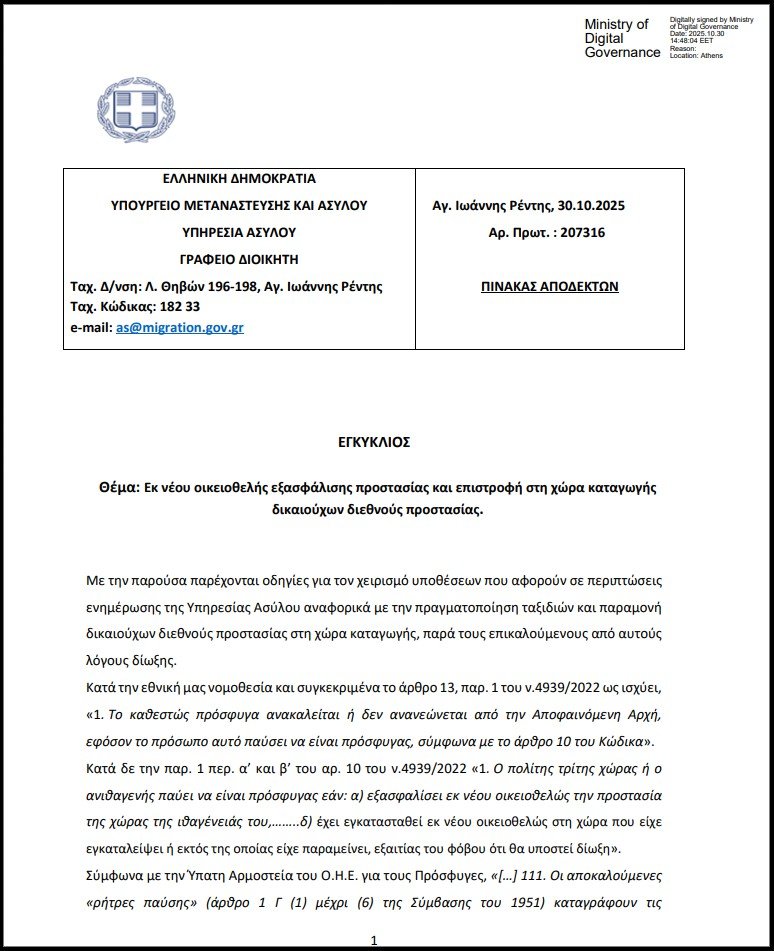Statutory refugees in Greece who return to their home country could lose their international protection, according to a new policy announced on October 30 by the Migration and Asylum ministry.
According to a new policy from Migration Minister Thanos Plevris, read by InfoMigrants, any person who has received refugee status and goes to their home country — where they claimed they were persecuted — will not be perceived as in danger there anymore. Greek authorities will be able to suspend or revoke such a person’s refugee status.

"When the refugee refuses to give proper explanations about their behavior," authorities could proceed to the removal of their protection status, the policy says. "Authorities are warned that in case of information about a return or intent of return in the home country, the Agency will proceed to an immediate administrative investigation (for example, checking on movement, interviews, cross-checking information with competent authorities) and, in case of newfound elements the Agency will immediately start the process of withdrawing the granted status," the policy says.
According to a source at the International Office for Migrations (IOM) in Greece, this "decision aims to penalize [foreigners] even more. Some statutory refugees, it is true, visit their family in their country, but this is generally in zones free from fighting," the source told InfoMigrants.
In Greece, like in other EU countries, statutory refugees risk losing their protection by travelling to their home country. In France, for example, 610 people lost their protection in 2024.
This policy comes at a time when Greece is toughening its legislation against migration, a move boasted by the Minister of Migration. "I believe in a very strict immigration policy," Thanos Plevris wrote on X on November 2.
Read AlsoGreece: Two bodies recovered in Chios and continued arrivals in Gavdos
'Go home or to prison'
In September 2025, the government voted in a law criminalizing migration. Irregular stay is not an administrative problem but a crime. Foreigners on Greek territory after their asylum request was rejected can be sentenced to two to five years of imprisonment and a 10,000 euros fine. "The message is clear […] If your asylum application is rejected, you have two choices: either you go home, or you go to prison," Thanos Plevris said in August.
In another October 20 policy from the Migration ministry, migrants who enter the country and stay without refugee rights have to be warned through a document of sanctions they could face. "If you are not a refugee and don’t have the right to protection, you have entered and are staying illegally in Greece. In this case: a/ your application will be rejected; b/you will be placed in administrative detention for up to 24 months; and c/you are committing a grave crime for which you shall be sentenced to 2 to 5 years in prison. The only way to avoid these consequences is to leave Greece," the document reads.
The law, voted in September, also removes the possibility for asylum rejects to obtain a visa after 7 years of living in Greece. Prison sentences were also voted into law for asylum rejects who would return to Greece undocumented.
In July 2025, authorities also suspended asylum for migrants coming to Crete from North Africa -- especially those coming from Libya.
Between January 1 and September 30, 2025, more than 30,000 migrants arrived in Greece by sea, 44 percent of whom landed in Crete (13 percent in Samos, 9 percent in Lesbos), according to the UNHCR. Last year, around 35,400 migrants arrived in Greece by sea over the same period.
